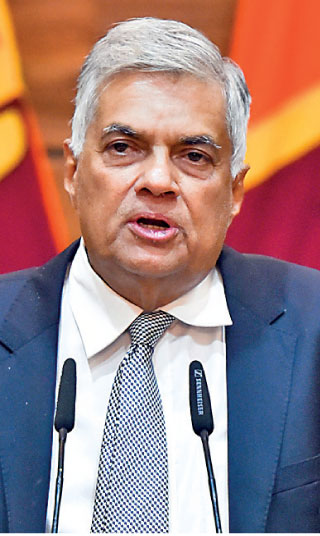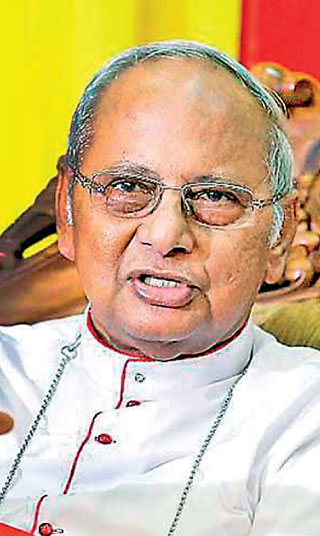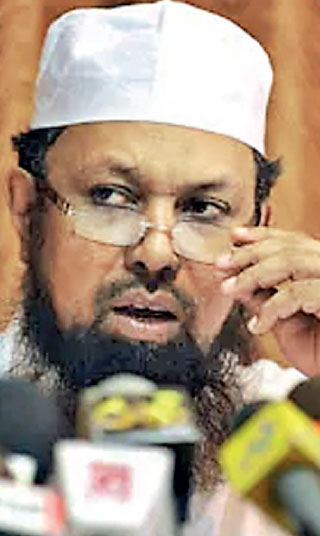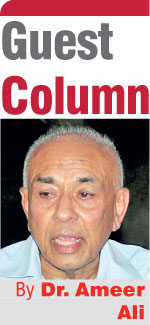Wednesday Feb 18, 2026
Wednesday Feb 18, 2026
Thursday, 15 September 2022 00:13 - - {{hitsCtrl.values.hits}}

President Ranil Wickremesinghe

Archbishop of Colombo Cardinal Malcolm Ranjith

ACJU President Mufti M.I.M. Rizwe
 While the focus of the whole country is on the future of its struggling economy, and how President Ranil Wickremesinghe (RW) is going to transform that economy into a competitive and innovative export-oriented industrial and technological power house to push Sri Lanka to First World status by 2048, there is one issue that seems to have strangely disappeared from making headlines since he became the president. This was an issue that annoyingly kept the pressure on and demanded speedy resolution from RW’s predecessor, Gotabaya Rajapaksa (GR). It was the issue of justice to the victims of the 2018 Easter bombing horror.
While the focus of the whole country is on the future of its struggling economy, and how President Ranil Wickremesinghe (RW) is going to transform that economy into a competitive and innovative export-oriented industrial and technological power house to push Sri Lanka to First World status by 2048, there is one issue that seems to have strangely disappeared from making headlines since he became the president. This was an issue that annoyingly kept the pressure on and demanded speedy resolution from RW’s predecessor, Gotabaya Rajapaksa (GR). It was the issue of justice to the victims of the 2018 Easter bombing horror.
After three independent different investigations with a final 22-volume report in 100,000 words the whole affair seems to have been swept under the carpet without knowing who the mastermind was. The Catholic Cardinal Malcolm Ranjith who travelled as far as the Vatican with his demand for justice and even threatened to take it to the International Court of Justice has surprisingly gone silent after RW replaced GR. Similarly, the Mufti of Islam from ACJU, who, had also raised his voice at convenience, and joined the Cardinal’s chorus, but on behalf of victimised Muslims, has adopted the same muteness. Is there a political motive behind their silence?
RW is still the chairperson of UNP, the nation’s oldest political party. He is also the most experienced and a scheming politician trying to resurrect the prestige of his party after its historic defeat at the last election. Having been chosen by GR and won the endorsement from a majority of parliamentarians, he is set to remain President at least until the end of 2024. He is no doubt trying to achieve (a) some semblance of political stability after the chaotic resignations an elected Prime Minister and a President, and (b) a modicum of economic recovery after the colossal devastation caused by mismanagement and a pandemic. To deal with the first he is trying hard to stitch a fissiparous coalition with SLPP as the dominant component, and with regard to the second he is totally depending on an IMF assisted program with all its stringent conditions. He should be counting on the success of these two to achieve a third objective, i.e., the rebuilding of his UNP.
Historically, the Catholic Church had been a staunch ally of UNP, and so was the Muslim community until SLMC and its breakaway group ACMC came into the picture. Now that these two ethnic parties have exposed their policy bankruptcy and fast losing support within the community, that RW in a master stroke has publicly rejected the controversial report of GR’s One Country One Law Task Force, which aimed at doing away with Muslim personal laws, and that he had indicated, while conversing with USAID Administrator Samantha Power, the possibility of releasing a few Muslim detainees who were arrested under suspicion of involvement in the Easter infamy, Muslim religious leaders under the guidance of ACJU may be willing to switch their allegiance back to UNP. All in all, it looks that old alliances seem to be resurfacing under RW’s presidency.
That may also be true of Tamil leadership under TNA, which was previously part of RW’s Yahapalana coalition. Thus, it is not unreasonable to suggest that the Catholic and Muslim religious leaders are intentionally keeping quiet about the demand for justice to Easter victims so that RW could be free of that headache and do what he is trying to do, i.e., resurrecting the UNP. If that is the case, it does not augur well for the reputation of the church and the mosque.
In reality however, RW has only a limited space to fly within the SLPP-built cage, and he is virtually the president of the SLPP government. The bulk of his 28-member cabinet and 38 regional ministers are from that party. The overarching philosophy or ideology that unites all SLPP members and their party cadre is ethno-nationalism of the Sinhala-Buddhist variety. It was that pernicious ideology that brought the Rajapaksas to power, and provided a cover to hide all their corruption and mismanagement, which ultimately bankrupted the economy. There is no way RW could hold them accountable for their misdeeds and mismanagement of public wealth.
True, he has issued strict financial strictures to his regional ministers so that government expenses could be cut down. But there is no requirement for accountability or penalty for those who breached those strictures, which is unavoidable given the past record of those ministers. The need for accountability and end to corruption, were the twin demands subsumed under Aragalaya’s call for systemic change. But these seem to be of no relevance in RW’s plan for economic recovery. Having been caged by SLPP, his hands are tied to pursue those demands even if he wished to. He therefore chose the short cut, to kill the Aragalaya and punish its originators and supporters.
In the same vein RW would like to be left free of any more controversy in relation to the Easter infamy. Even to release those 22 volumes would open a new can of worms, which would jeopardise his plans to rebuild his own party while remaining beholden to the Rajapaksas. If he is innocent, as he claims, of suppressing intelligence received from domestic and foreign sources, why then should he fear releasing the PCoI report to the public? Shouldn’t the Cardinal and Mufti keep the pressure on him to do so?
However, in the final analysis, it is systemic change and not the re-emergence of UNP that would bring justice to all minorities. For more than 70 years every religious and ethnic minority in this country had suffered under an ethno-national majoritarian democracy. And rather than any particular minority it is the country that stood to lose most by this distorted democracy. It is that realisation which propelled the youth to start the Aragalaya. Theirs is a pristine goal that should not be allowed to die in the wake of RW’s betrayal and repression. Until the full impact of IMF reforms come into effect and start impoverishing the middle class through higher taxes and inflationary prices, the current absence of queues for fuel and price reduction for selected consumer items provide a deceptive image of an otherwise illusory recovery. Having learnt their lessons, the Aragalaya youth would re-emerge with new vigour, strategies and wider support to face RW’s gendarmerie. Theirs is the future and the country needs them. Religious leaders have no choice but to back their cause.
(The writer is attached to Murdoch Business School, Murdoch University, Western Australia.)